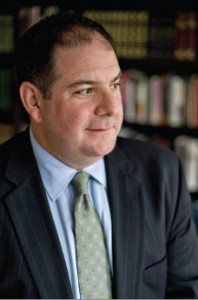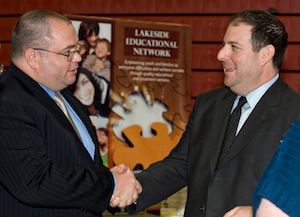 [dropcap3]F[/dropcap3]or a second year now, I have had the privilege to teach a January-term class. The new two-week winter session has been a successful addition to our roster and enrollment in it increased significantly this year. In this format, undergraduate students can complete three credit hours, joining the many graduate and degree completion students who have been taking winter courses for years. The course I taught was undergraduate Political Science, one that was part of my regular teaching load when I served on the faculty in the 1990s. It is a course that had a tremendous impact upon me as a student and one that I enjoy teaching very much. The subject matter is engaging. The students, most of whom are upperclassmen facing entrance into graduate school, the workforce, and new roles as independent citizens, are responsive and willing to think about politics and society in a way many of them had not before. And the current events at any given point in time usually lend themselves well to real world application of the ideas we encounter and explore. The students in the class are business, social work, education, and ministry majors. They have had diverse academic experiences at PBU. They are preparing for different vocations. They enter the course with varying degrees of prior knowledge concerning political thought and different political convictions. This diversity only enriches the classroom experience for them and for me. The discussions that result are stimulating. But it is also what they share in common that pushes the course to a deeper level of thinking and enhances the development of understanding and perspective. The core curriculum is designed to create a shared experience that permits those of us who teach to push experienced students farther in their consideration of the implications of biblical teaching for all of life and academic thought. Teaching an occasional course is a true blessing for me, certainly because I thoroughly enjoy the students, but also because it reminds me as President, in a very practical way, what we are doing and how we are doing it. Teaching a course such as this also reminds me of the diversity and rigor of academic life at PBU. It is evidence that our students are earning a university education that is challenging them and preparing them.
[dropcap3]F[/dropcap3]or a second year now, I have had the privilege to teach a January-term class. The new two-week winter session has been a successful addition to our roster and enrollment in it increased significantly this year. In this format, undergraduate students can complete three credit hours, joining the many graduate and degree completion students who have been taking winter courses for years. The course I taught was undergraduate Political Science, one that was part of my regular teaching load when I served on the faculty in the 1990s. It is a course that had a tremendous impact upon me as a student and one that I enjoy teaching very much. The subject matter is engaging. The students, most of whom are upperclassmen facing entrance into graduate school, the workforce, and new roles as independent citizens, are responsive and willing to think about politics and society in a way many of them had not before. And the current events at any given point in time usually lend themselves well to real world application of the ideas we encounter and explore. The students in the class are business, social work, education, and ministry majors. They have had diverse academic experiences at PBU. They are preparing for different vocations. They enter the course with varying degrees of prior knowledge concerning political thought and different political convictions. This diversity only enriches the classroom experience for them and for me. The discussions that result are stimulating. But it is also what they share in common that pushes the course to a deeper level of thinking and enhances the development of understanding and perspective. The core curriculum is designed to create a shared experience that permits those of us who teach to push experienced students farther in their consideration of the implications of biblical teaching for all of life and academic thought. Teaching an occasional course is a true blessing for me, certainly because I thoroughly enjoy the students, but also because it reminds me as President, in a very practical way, what we are doing and how we are doing it. Teaching a course such as this also reminds me of the diversity and rigor of academic life at PBU. It is evidence that our students are earning a university education that is challenging them and preparing them.
Our mission clearly states that we exist to educate students, and each institutional objective begins with the phrase, “As an academic institution…” This is intentional. PBU students need not apologize for the education they receive at a biblical university. In fact, our apologetic is that our students are challenged to think differently and deeply in every area of study, that they are well educated and ready for graduate studies and professional life. As an example, in the political science course we build upon what students have learned in their Bible and theology courses, as well as their introductory social science courses and professional studies. The course begins by having students address the simple but profound question of how their understanding of human nature informs and shapes their view of the nature of politics. The course is more than a civics primer. It is an exercise in developing a perspective that is informed, coherent, and intentional. What people think about government and politics, how they participate as citizens, and the way in which they conduct themselves within the political and cultural discourse should be built upon their most fundamental assumptions about humanity and the world. I would put my students in political science up against any students anywhere because they have asked underlying questions that too often go unasked, let alone unanswered. And this happens across the University and curriculum at both undergraduate and graduate levels. PBU takes seriously the life of the mind. I trust the articles in this issue will demonstrate that fact and also show that the life of the mind is a profoundly biblical commitment.
The University has long been an academic leader and innovator.

I am often asked about academics at PBU. There is a general curiosity about what we offer. People sometimes do not grasp the diversity and depth of academic life here even when they are holding the literature in their own hands. I understand. They do not expect us, based upon our name and core convictions, to be broad. The ironic thing about these inquiries is that the University has long been an academic leader and innovator. The addition of professional degrees, the strengthening of the liberal arts curriculum, and the hiring of faculty who value the broad spectra of academic disciplines was very forward-thinking and has benefitted our students as well as the church, society, and the world. Today, we continue the work of strengthening our academic programs, expanding our offerings to include opportunities for students that are consistent with our mission and vision but enrich the student experience and learning at PBU. A biblical university can and should be a place where people are not surprised that the life of the mind is valued, but rather, where they expect it. I am encouraged by the diverse and rigorous programs we offer and excited about the future development of new programs that will educate students to serve Christ well.
[framed_box]Todd J. Williams, Ph.D., has been the President of Philadelphia Biblical University since January 2008. He served as faculty and an administrator from 1996 to 2001, and then returned as Provost in 2005. Interact with Dr. Williams at PBU’s blogsite.
[/framed_box]